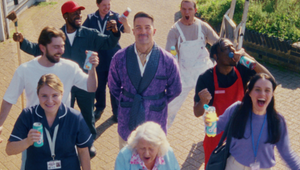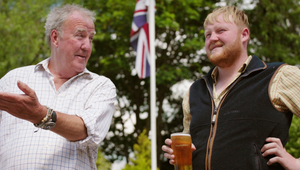
The Secrets of Creative Directors: Resilience, Rejection and the Art of Giving a F*ck Anyway

I’ve noticed that creative directors get asked the same questions and we always answer the same way. A combination of how hard we work, how hard the work is, how good our work is, how bad everyone else’s work is and how much we wish we’d made their work really.
If you’re a female creative director you don’t even get asked about the work, you get asked what non-profit you’ve started to help other women in your oodles of spare time being a woman That Can Have Everything. Men don’t get asked about their non-profits. They get asked when they’re starting an agency or writing a book.
But the questions I get from creatives are very different. I get asked how creative directors keep going, how we bounce back from constant rejection, the many bad days and ghost decks of campaigns that would have changed everything - and how we continue to get excited about each new brief anyway. The energy and resilience that most creative directors have is, to be blunt, childish. It’s doglike, it’s kind of annoying but in this industry, it’s also insanely effective. I use ‘insanely’ knowingly.
I’m going to share a few tips that have helped me – I’m actually sharing hacks I’ve learned from other people and wrapping them up in an essay that may at a squint seem like it came from me but has really been mined and curated from much smarter people – just like great advertising. Let’s start with the end. Because what’s the point in having a sparkly brain if you don’t answer questions you’ve posed to yourself back to front?
1. There’s much talk about ‘switching off’ and the struggle to do so. I am at one with editing until it’s done, making ‘last minute’ deck tweaks over the weekend, silently plotting social virality from every newsflash because I take back my downtime elsewhere. On a quiet Monday, I’ll get the 5pm film showing, I’ll do an hour of hot yoga or fail to do an hour of meditation and eat biscuits for an hour instead. Where I used to struggle with switching off was at the end of the working day moving into being a sociable, rational person that talks about things that are not ads with people that are not Ad People. I was lucky to get advice on how to do this from Danny Bush (who ironically always had the best glasses at work and now works at Specsavers. They’ve got an eye for it.). When it hits 6pm, Danny marks the occasion by sticking on a record, making a cold drink and celebrating the hour with a little boogie. He gave me some banging playlists when I complained I didn’t have a record player and therefore couldn’t possibly attempt to help myself with this good advice. I’ve been doing it ever since, this changing of tempo, switching my art obsessed mind to appreciating a finished form of art I had no influence over whatsoever. It really helps.
2. Dealing with rejection is helpfully, if partially, solved by Cherl Strayed who in her novel, ‘Wild’, advised everyone to ‘Put yourself in the way of beauty’ when you’re feeling sad or hopeless - or perhaps mildly vengeful at a perfect idea left on the shelf in favour of an unsightly banner ad with 15 messages. I passed this advice on to an old boyfriend who took it literally and walked the Pacific Crest Trail from Mexico to Canada like Reese Witherspoon did in the movie. I think it helped him too. On a less literal level, a gallery, museum, park – any free beautiful thing near your desk – helps when you or the extension of you, your work, has been rejected in a massive way. Sometimes everyone involved seems to care less than you, but you still have to come back and work with them tomorrow so take time to reset and recentre and, if nothing else, look at beautiful stuff that couldn’t possibly have been created by bureaucracy, until you feel better. We really do need to see beautiful things very often to stay happy.
3. We are artists serving capitalism. Accept it or leave. The only Masterclass featuring ad creatives currently available (Nils Leonard, may well make this factually incorrect shortly but good for him) features Jeff Goodby and Rich Silverstein, and it’s great. All the Masterclasses are, except the one with Lewis Hamilton, who I love dearly but when asked for an example of how he overcame a big challenge brought up his sweet tooth. ‘So how did you overcome it?’ the prompter helpfully prods. ‘I carried a bag of Haribo in my pocket at all times.’ He sheepishly responds. ‘And, so how did you overcome it?’ a note of desperation entering the prompter’s chat. ‘Well, I knew I could have one whenever I wanted one, so I just didn’t.’ Silence from the prompter. Alas, we cannot Masterclass our way to Sir Lewis is the moral of that story.
In their class, Goodby and Silverstein teach that while advertising is an artform, it’s art that serves the needs of clients and capitalism. It’s a harsh but valid truth and much like nihilism, if you can accept that life is pain, life gets easier.
Have hobbies and artistic pursuits that you explore and love outside of work. It’s wonderful that we can use most of our skills in this job but the projects we do are bought and paid for by brands. And if a client wants to put out their own edit, they will. When you accept this is a possibility, you can use your wily mind to unlock better edits and output with them. Your artistic integrity cannot be taken away from you by a brand. They are renting it to make art that serves capitalism but the freehold always, always belongs to you.
And as a sidenote, I think we can agree that there is nothing more satisfying than when an ad creative proves this point by starting a successful brand themselves.
4. Two-week holidays. There, I said it. I don’t want to spend a mini break pretending I can’t see all the emails coming in. I want to be somewhere so remote everyone still uses Nokias. I want to come home wearing questionable scarves with a whole new philosophy on spirituality. I want work cover urgently organised because everyone feels that two weeks is a Very Long Time. I want to switch off for two weeks so I can keep going for another year. My colleague recently came back from a three-week trip to South America just in time for a brilliant ad we’d finished to be sent back into edit. Watching this colleague float through the emotional emails, late night calls and general chaos like a proper living deity is bringing me strength and joy. And that’s the other important bit: when your colleagues focus on their balance and happiness, you get to vibe off their joy and calm until you can do the same. We lift each other up, invisibly and without fail, every damn day.
5. The last one is inspired by the wisdom of Zadie Smith, or perhaps more inspired by avoiding the wisdom of Oscar Wilde. It’s not his fault, he died when he was still pretty young and people had been pretty mean to him, but he does have some absolute clangers in his musings that could turn us all into navel gazers. Like this one, ‘To live is the rarest thing in the world. Most people exist, that is all.’ It really does set you up to think you’re the only real one among all ‘dem haters. I don’t think it’s easy to be happy if you think you’re the only one who truly ‘gets it’. And that’s where Zadie comes in, with the sage advice only Zadie’s can give to the Wildes of this world. ‘I think the hardest thing for anyone is accepting that other people are as real as you. That it’s not using them as tools, not using them as examples or things to make yourself feel better or things to get over or under. Just accepting that they are absolutely as real as you are and have all the same expectations and demands.’
Life is hard, increasingly so and I cherish the kindness I’ve received in this industry on days, weeks and months when terrible things were happening in the background. We work at such pace and with such raging adrenaline that we can forget everyone is real quite easily. But dehumanising others will only stress you out. Find the human in them and you’ll protect it in you.
I hope that some of this advice, craftily curated from other people, is slightly more useful than me telling you about the work, just this once. I will go back to talking about it very seriously now. But if we ever meet, do ask me when I’m writing that book.















